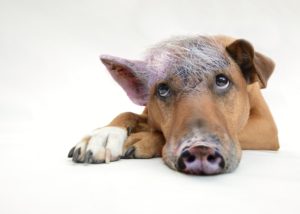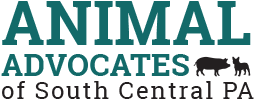You Wouldn’t Have a Personality, Either, If You Were Killed at Six Months
Posted in: Activism, Vegan Living
At the end of last year – which currently feels like eight long months ago, instead of a quick three! – I wrote an open letter to writer Jennifer Finney Boylan in response to an opinion piece she published in the New York Times titled Why Do I Eat Pigs, and Give My Dog Her Own Cowboy Hat?
Take a minute to read it. I’ll wait.
I don’t know about you, but when I first read it, I had to catch my breath, then catch it again, and then walk away.
I needed to analyze just why I was so disturbed.
She wrote that if we really thought about our relationship with animals, we would all become vegetarian. She admits to going vegan at “various moments,” but relapses because, essentially, bacon tastes good. She identifies the contradiction from her article’s title as being “troublesome,” yet concludes that, while it is fundamentally unfair, humans have to learn to live with contradictions.
No. We don’t. And we shouldn’t.

What disturbed me the most, I think, is that her spectacular level of awareness, self- and otherwise, belies her glib, “oh, well, that’s the way it is” conclusion. She, of course, is not alone in living within this contradiction – all former omnivores lived there, myself included. It’s easy to live in this system because it is like air, invisible and everywhere. Reconciling this contradiction begins with naming it. It is “carnism,” a term identified by Dr. Melanie Joy [CARNISM] and it’s the default condition of most societies on earth.
Even when carnism is recognized, Finney Boylan acknowledges it in her title whether she knows the term or not. It’s easy to look the other way because humans privilege themselves over other animals. This is called Speciesism. She writes that her dog, Chloe, makes her feel loved, and indeed that that is her (Chloe’s) “job.” This implies that the pig (who becomes her bacon) wouldn’t make her feel loved if allowed to live. Her bacon, however, didn’t have that chance. Her bacon came from a baby, and like nearly all farmed animals, that baby didn’t get the time, the stimulation, or the chance to develop loving familial and friendly bonds. And even in their very short lives, they didn’t get to pursue their own interests. Chloe most assuredly got to experience these things.
All of this would surely contribute to someone who could make her (us!) feel loved. But that isn’t the true point – our feeling loved – rather, it’s that they get to pursue their interests. At the end, she even suggests that this is a strange metric – whether or not we might feel loved. Treating someone else as a means to an end is a speciesist idea. Loving some animals and eating others is speciesist because it privileges some over others. It doesn’t take any real moral imagination (which she writes that she lacks); it just requires her to apply the same logic she, presumably, applies to any group of human animals that has been unfairly treated. Peter Singer [Animal Liberation at 30 | by Peter Singer] writes that such a privilege is “a prejudice that survives because it is convenient for the dominant group,” where the dominant group is all humans.
When I first wrote this, those oh so long months ago around Christmas, we were visiting my extended family. As we were preparing dinner, I looked at the stove. There was a pan covered with tinfoil. As it registered in my mind what it actually was, I could only think of the pig whose life was taken. No doubt she or he was a baby made to grow big, and fast. A baby who didn’t have the time or opportunity to pursue his or her interests – to cool off in a mud puddle, snuggle up to mommy, or root around for food and other interesting things. That pig’s fate was a result of “vagary and caprice” just like Finney Bolen fears her friendship with Chloe is. Her friendship is indeed just vagary and caprice, but not simply because Chloe was born a dog. Finney Boylen has decided that personality rules, so those who get to develop a personality are those she privileges as worthy of her friendship.
It looks like we are in for a long stretch of solitude during this current pandemic (its relationship to eating animals is for another post). So I suggest that if you’re still eating animals, read Joy’s Why We Love Dogs, Eat Pigs, and Wear Cows and Singer’s Animal Liberation. Or watch a documentary such as Dominion or Earthlings.
If you still aren’t convinced a pig can have personality, visit https://www.estherthewonderpig.com, and read all about Esther.
And when we are once again allowed to move about freely, visit a farm sanctuary. Meet all of the folks who were allowed to develop their own personalities, to do their own thing!
I wasn’t asking Finney Boylen to become an animal rights activist. And I am not asking you to necessarily become one, either. What I am asking you is to reconsider your relationship with all animals; not just those who have a personality, or who make you feel loved, or who you deem have another sort of “job” to do.
Leave animals off your plate. They aren’t commodities, and they aren’t here for our use or entertainment.
It will be good to live with one less contradiction. It will feel good, be better for our planet; but most especially, it will be good for the animals. I promise.
That blog post was titled “An Open Letter to Jennifer Finney Boylan and Other Pre-Vegan Friends OR ‘Why Do I Eat Pigs, and Give My Dog Her Own Cowboy Hat?’ – Good Question, Here’s the Answer!” It appeared on the Main Street Vegan Blog as An Open Letter to Jennifer Finney Boylan and Other Pre-Vegan Friends, by Alicia Siebenaler, VLCE on December 31, 2019.
__________
Bio:
Alicia Siebenaler became vegan in 2015. While pregnant with her first child, she had an epiphany about the vast—and heartbreaking—global dairy industry. While it is and always will be an ethical stance for her, her commitment to do better for the planet and to treat its non-human occupants as ends in themselves instead of as commodities has deepened as she has learned more about the nutritional benefits of a vegan lifestyle. In July 2019, Alicia left the world of higher education development after more than a decade to work on the next chapter of her life – how best to promote veganism and to support others making the transition from the Standard American Diet (SAD). She graduated with honors from Hunter College where she earned her bachelor’s degree in philosophy and political science. She lives in Katonah, NY with her husband and two young children.
You can find her on Instragram @AliciasVegan


Leave a Reply